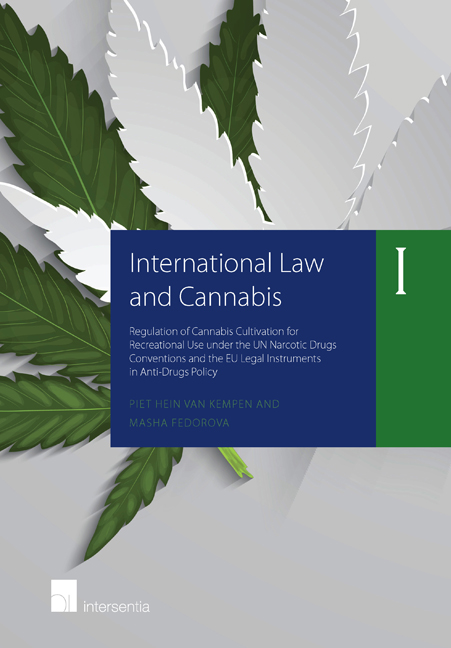 International Law and Cannabis I
International Law and Cannabis I Book contents
- Frontmatter
- Preface
- Contents
- List of Cases
- List of Abbreviations
- Chapter 1 Introduction
- Chapter 2 Obligations under International Law Regarding Cannabis: UN Narcotic Drugs Conventions
- Chapter 3 Obligations under European Law Regarding Cannabis: EU Laws on Drugs
- Chapter 4 Assessment of the Arguments and Initiatives Regarding Regulation of Cannabis Cultivation
- Chapter 5 Conclusion
- Bibliography
- Executive Summary of Volume II
- About the Authors
Chapter 2 - Obligations under International Law Regarding Cannabis: UN Narcotic Drugs Conventions
Published online by Cambridge University Press: 09 November 2019
- Frontmatter
- Preface
- Contents
- List of Cases
- List of Abbreviations
- Chapter 1 Introduction
- Chapter 2 Obligations under International Law Regarding Cannabis: UN Narcotic Drugs Conventions
- Chapter 3 Obligations under European Law Regarding Cannabis: EU Laws on Drugs
- Chapter 4 Assessment of the Arguments and Initiatives Regarding Regulation of Cannabis Cultivation
- Chapter 5 Conclusion
- Bibliography
- Executive Summary of Volume II
- About the Authors
Summary
INTRODUCTION
Cannabis first became subject to international control through the International Opium Convention of 1925 (the ‘1925 Convention’). This convention – to which the Netherlands was also a party – limited itself to regulation in connection with international trade. It did not prohibit the production of cannabis as such and did not impose any obligations on states with regard to the domestic trade in cannabis or its consumption. After the Second World War, the United Nations took over the supervision of multilateral drug control from the League of Nations. This led to a stricter control with a wider scope. The three most important instruments created for this purpose are:
1. Single Convention on Narcotic Drugs, 1961 as amended by the Protocol amending the Single Convention on Narcotic Drugs, 1961 of 1972;
2. Convention on Psychotropic Substances, 1971;
3. United Nations Convention Against Illicit Traffic in Narcotic Drugs and Psychotropic Substances, 1988.
The second convention – the 1971 Convention on Psychotropic Substances – has no particular relevance for this book. Admittedly, delta-9-tetrahydrocannabinol (THC) is a psychoactive substance mentioned in Schedule II of the convention and occurs in cannabis, but because it is not common practice to extract that substance from cannabis, and such an extraction is not what this book is about, this convention will not be considered further. That will certainly not be the case for the other two conventions: they are key to this chapter.
VARIATION BETWEEN PARTIES TO THE CONVENTION
In the discussion of these conventions, we must take into consideration that the interests and policy insights of the states parties can vary considerably. For example, a distinction can be made between cultivating states (countries where the organic material needed for drugs is grown), manufacturing states (countries where synthetic production takes place), strong control states (countries that are culturally opposed to drug use and suffer from the consumption of drugs in their territory), weak control states (countries that consider drug control to be an internal affair and regard foreign intervention as a breach of their sovereignty), and neutral states (countries that have no clear-cut interests regarding drug control either way).
- Type
- Chapter
- Information
- International Law and Cannabis IRegulation of Cannabis Cultivation for Recreational Use under the UN Narcotic Drugs Conventions and the EU Legal Instruments in Anti-Drugs Policy, pp. 11 - 100Publisher: IntersentiaPrint publication year: 2019


